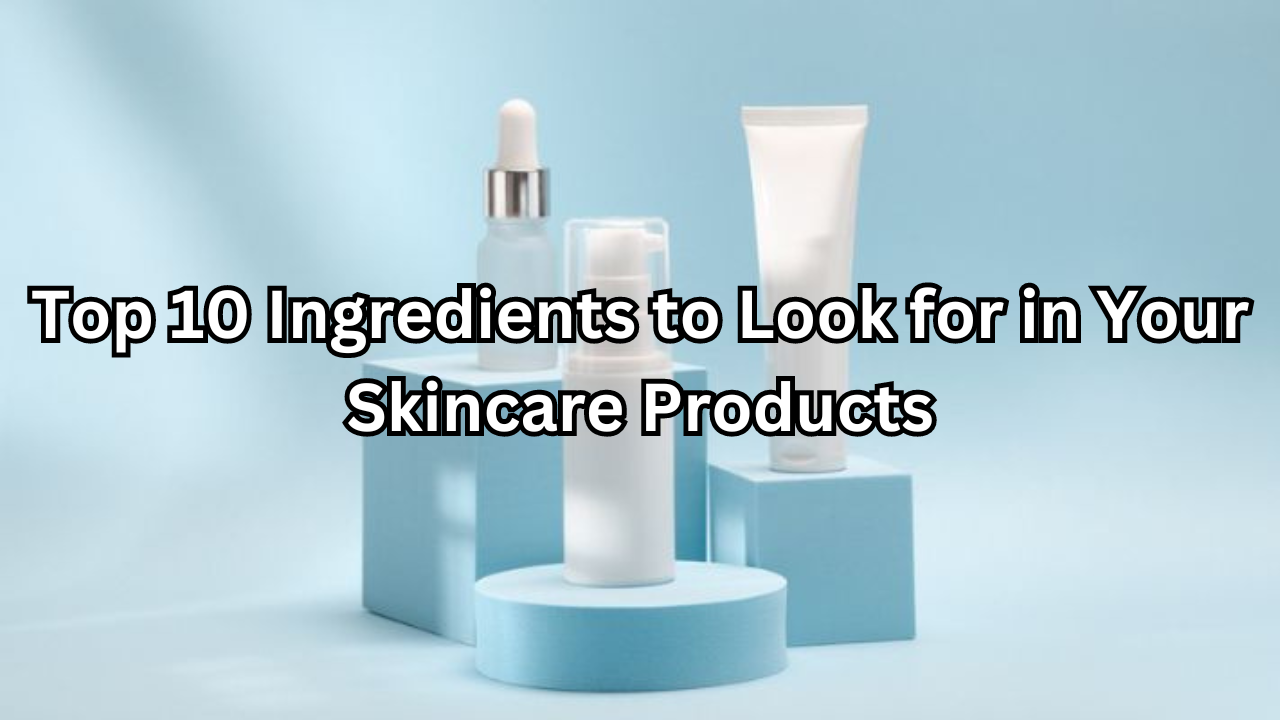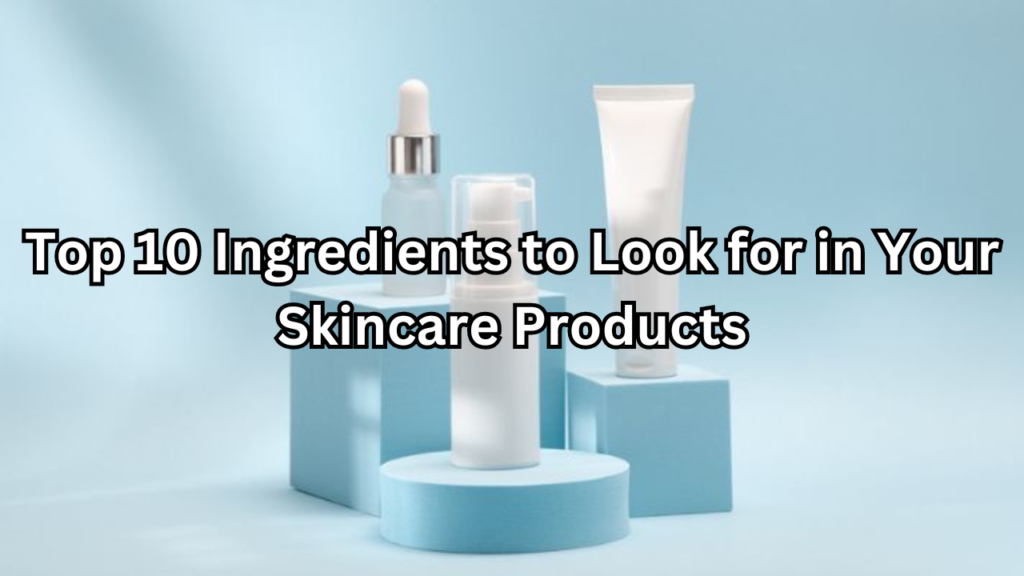

Table of Contents
Introduction
Selecting the Top 10 Ingredients in skincare products is crucial for achieving and maintaining healthy, radiant skin. With a vast array of options available, it can be overwhelming to determine which ingredients are truly effective. Understanding the role of different skincare ingredients can help you make informed choices tailored to your skin’s unique needs. Different ingredients target various skin concerns, from hydration and anti-aging to acne and pigmentation. For instance, while hyaluronic acid excels at deeply hydrating and plumping the skin, vitamin C brightens the complexion and combats signs of aging. Each ingredient offers specific benefits, making it essential to select products that address your individual skin issues. By familiarizing yourself with the key ingredients that deliver real results, you can optimize your skincare routine and enhance your overall skin health. This guide will explore the top 10 ingredients to look for in skincare products and explain how they can help you achieve your skincare goals.
Hyaluronic Acid
Benefits: Hyaluronic acid is renowned for its exceptional hydrating properties. This ingredient has the remarkable ability to hold up to 1,000 times its weight in water, which makes it highly effective at delivering deep and lasting moisture to the skin. By boosting hydration levels, hyaluronic acid helps to plump the skin, reducing the appearance of fine lines and creating a smoother, more youthful complexion.
Ideal for: Hyaluronic acid is suitable for all skin types, making it a versatile addition to any skincare routine. It is particularly beneficial for individuals with dehydrated skin, as it replenishes moisture levels without adding excess oil. Its gentle nature also makes it appropriate for sensitive skin.
How to Use: To incorporate hyaluronic acid into your routine, look for products such as serums, moisturizers, and masks that feature this ingredient. Serums are particularly effective, as they deliver a concentrated dose of hyaluronic acid directly to the skin. For optimal results, apply a hyaluronic acid serum to damp skin and follow up with a moisturizer to lock in hydration. Masks containing hyaluronic acid can provide an extra boost of moisture and are perfect for a weekly skin-rejuvenating treatment.
Vitamin C
Benefits: Vitamin C is celebrated for its powerful brightening effects and antioxidant protection. This essential nutrient helps to combat oxidative stress caused by free radicals, which can lead to premature aging and skin damage. Vitamin C also plays a crucial role in reducing hyperpigmentation, evening out skin tone, and enhancing overall radiance. Regular use can result in a more luminous complexion and a noticeable reduction in dark spots and discoloration.
Ideal for: Vitamin C is particularly beneficial for individuals with dull skin, uneven skin tone, and those concerned with signs of aging. It is an excellent choice for anyone looking to boost their skin’s brightness and improve its overall texture.
How to Use: To maximize the benefits of Vitamin C, incorporate it into your skincare routine through serums, creams, or as part of your morning regimen. Vitamin C serums are especially effective, delivering a high concentration of the nutrient directly to the skin. Apply a few drops of Vitamin C serum to clean, dry skin in the morning, followed by a moisturizer and sunscreen to protect against UV damage. Vitamin C creams can be used as a daily moisturizer, providing a more gradual and sustained brightening effect.
Retinol
Benefits: Retinol, a derivative of vitamin A, is highly regarded for its anti-aging benefits. It effectively reduces the appearance of wrinkles and fine lines by promoting cell turnover and stimulating collagen production. Additionally, retinol improves skin texture and helps to smooth rough patches, making it a powerful tool for achieving a more youthful and even complexion. It also addresses acne-prone skin by unclogging pores and preventing breakouts.
Ideal for: Retinol is ideal for aging skin, acne-prone skin, and those with uneven texture. Its ability to enhance skin renewal and diminish signs of aging makes it a valuable addition to the skincare routines of individuals looking to combat wrinkles and refine their skin’s texture.
How to Use: Introduce retinol into your routine gradually to allow your skin to acclimate and minimize potential irritation. Start with a lower concentration and apply it in the evening after cleansing and before moisturizing. Use retinol serums or creams, focusing on areas where you wish to see improvement. Initially, use it 2-3 times a week, gradually increasing frequency as tolerated. Always apply sunscreen during the day, as retinol can increase your skin’s sensitivity to UV rays.
Niacinamide
Benefits: Niacinamide, also known as vitamin B3, offers a range of skincare benefits. It effectively reduces redness and inflammation, making it ideal for calming sensitive or irritated skin. Niacinamide also strengthens the skin barrier, enhancing its ability to retain moisture and defend against environmental stressors. Additionally, it helps to regulate oil production, making it a valuable ingredient for those with oily or acne-prone skin. Its ability to improve skin tone and texture further adds to its versatility.
Ideal for: Niacinamide is particularly beneficial for sensitive skin, acne-prone skin, and those with uneven skin tone. Its soothing properties make it a good choice for calming inflammation, while its barrier-repairing benefits support overall skin health.
How to Use: Incorporate niacinamide into your routine through serums or moisturizers. Niacinamide serums are often used to deliver a concentrated dose of the ingredient directly to the skin, while moisturizers with niacinamide provide additional hydration and barrier support. It can be used in combination with other skincare ingredients, such as hyaluronic acid and vitamin C, to enhance overall effectiveness. Apply niacinamide products both morning and evening for best results, and always follow up with sunscreen during the day to protect your skin.
Salicylic Acid
Benefits: Salicylic acid is a beta-hydroxy acid (BHA) known for its effective exfoliating properties. It penetrates deep into the pores to dissolve excess oil and dead skin cells, which helps to unclog pores and prevent acne. By promoting gentle exfoliation, salicylic acid helps to reduce breakouts and improve overall skin clarity.
Ideal for: Salicylic acid is particularly beneficial for individuals with oily and acne-prone skin. Its ability to target and address clogged pores makes it a go-to ingredient for managing and reducing acne.
How to Use: Incorporate salicylic acid into your skincare routine through cleansers, toners, or spot treatments. Salicylic acid cleansers can help to prevent breakouts with daily use, while toners provide a more targeted approach to pore-cleansing. For spot treatments, apply directly to affected areas as needed. Start with a lower concentration to assess your skin’s tolerance and gradually increase usage if necessary.
Peptides
Benefits: Peptides are short chains of amino acids that play a vital role in supporting the skin’s structure and function. They enhance skin elasticity, improve firmness, and stimulate collagen production, which can reduce the appearance of fine lines and wrinkles. By reinforcing the skin’s supportive framework, peptides help maintain a youthful and resilient complexion.
Ideal for: Peptides are ideal for aging skin and those experiencing a loss of firmness. Their ability to promote collagen synthesis and improve skin elasticity makes them an excellent choice for those concerned with visible signs of aging.
How to Use: Use peptides in serums, moisturizers, and eye creams. Peptide serums deliver a concentrated dose of these beneficial compounds, while moisturizers and eye creams provide ongoing support and hydration. Apply peptide-containing products both morning and evening to maximize their benefits, and integrate them into your regular skincare routine for best results.
Ceramides
Benefits: Ceramides are lipids that are essential for maintaining the skin’s natural barrier. They help to strengthen the skin barrier, which improves moisture retention and soothes irritated skin. By reinforcing this protective layer, ceramides help to prevent moisture loss and enhance overall skin health.
Ideal for: Ceramides are particularly beneficial for dry, sensitive, and compromised skin. Their barrier-repairing properties make them an excellent choice for addressing issues related to dryness and skin sensitivity.
How to Use: Incorporate ceramides into your routine through moisturizers, creams, and barrier repair products. Ceramide-rich moisturizers provide deep hydration and help to reinforce the skin barrier, while barrier repair creams offer intensive support for compromised skin. Apply these products as part of your daily skincare routine, both morning and evening, to maintain optimal skin hydration and protection.
Alpha Hydroxy Acids (AHAs)
Benefits: Alpha Hydroxy Acids (AHAs) are a group of water-soluble acids that provide excellent exfoliation for the skin’s surface. They work by dissolving the bonds between dead skin cells, promoting their removal and revealing fresher, brighter skin underneath. AHAs help to smooth skin texture, reduce the appearance of fine lines, and address hyperpigmentation, leading to a more even and radiant complexion.
Ideal for: AHAs are especially beneficial for dull skin, uneven texture, and hyperpigmentation. Their exfoliating properties make them an ideal choice for revitalizing tired-looking skin and addressing discoloration.
How to Use: Incorporate AHAs into your skincare routine through exfoliating toners, masks, and serums. Exfoliating toners can be used daily or several times a week to maintain a smooth skin surface. AHAs in masks provide a more intensive exfoliation, ideal for weekly treatments. Serums with AHAs offer targeted exfoliation and are typically used once or twice a day. Always follow up with sunscreen during the day, as AHAs can increase skin sensitivity to UV rays.
Beta Hydroxy Acids (BHAs)
Benefits: Beta Hydroxy Acids (BHAs) are oil-soluble acids that penetrate deep into the pores to dissolve excess oil and dead skin cells. This process helps to exfoliate from within the pores, reducing blockages and preventing acne. BHAs are also effective in smoothing skin texture and minimizing the appearance of blemishes.
Ideal for: BHAs are particularly suited for oily and acne-prone skin. Their ability to address pore congestion and reduce acne makes them a valuable ingredient for managing breakouts and controlling excess oil.
How to Use: Use BHAs in exfoliating cleansers, toners, and treatments. Exfoliating cleansers with BHAs can help to prevent acne and keep pores clear on a daily basis. Toners with BHAs provide additional pore-clearing benefits and can be used after cleansing. For more targeted treatment, apply BHA-based treatments directly to problem areas. Start with a lower concentration to gauge your skin’s tolerance and increase as needed.
Green Tea Extract
Benefits: Green tea extract is renowned for its powerful antioxidant and anti-inflammatory properties. It helps to protect the skin from environmental damage by neutralizing free radicals and reducing oxidative stress. Additionally, green tea extract soothes irritation and redness, making it a calming ingredient for sensitive skin.
Ideal for: Green tea extract is ideal for sensitive skin, redness, and overall skin health. Its soothing and protective qualities make it a beneficial ingredient for maintaining a balanced and healthy complexion.
How to Use: Incorporate green tea extract into your skincare routine through serums, masks, and creams. Serums with green tea extract offer antioxidant protection and calming effects, while masks provide a soothing and rejuvenating treatment. Creams with green tea extract can help to maintain skin health and reduce inflammation throughout the day. Use these products as part of your regular routine to support and protect your skin.
Conclusion Top 10 Ingredients for Skincare
Incorporating the right top 10 ingredients into women skincare routine can significantly enhance your skin’s health and appearance, which is essential for a flawless fashion look. The top ingredients—hyaluronic acid, vitamin C, retinol, niacinamide, salicylic acid, peptides, ceramides, AHAs, BHAs, and green tea extract—each offer unique benefits tailored to various skin concerns. Hyaluronic acid provides deep hydration, vitamin C brightens and combats signs of aging, and retinol boosts collagen production and smooths skin texture. Niacinamide calms and strengthens the skin barrier, while salicylic acid and BHAs help to clear acne and reduce oiliness. Peptides enhance elasticity, ceramides restore the skin barrier, AHAs exfoliate and improve texture, and green tea extract offers antioxidant and anti-inflammatory protection. Incorporating these ingredients into your routine can elevate your fashion game by ensuring your skin looks its best.
For optimal results, consider combining ingredients that complement each other. For instance, using a vitamin C serum in the morning followed by a moisturizer with hyaluronic acid can boost hydration and brightening effects. Retinol and niacinamide can work together to improve texture and tone while managing sensitivity. When integrating multiple ingredients, start gradually to monitor how your skin responds and avoid potential irritation. Remember, the best beauty skincare routine is one that addresses your individual skin needs and concerns. By choosing products based on your specific skin type and issues, you can create a personalized regimen that effectively targets your goals, leading to healthier, more radiant skin.





